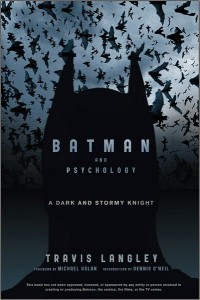During Comic-Con, I had the opportunity to meet and chat with Dr. Travis Langley, author of Batman and Psychology.
I started out asking Dr. Langley about the panel he moderated Thursday at Comic-Con. “Well, originally it was going to be focused more on Batman, but because we wound up with Lee Meriweather joining us I talked about Catwoman a lot more than I would have otherwise. The topic was ‘The Dark Knight Rises: Is Batman Broken?’ and this was a topic I had in mind for two years. Originally two years ago, when I mentioned it to Michael Uslan – the man who produced every Batman movie to date – this is my fourth year in a row to do a panel with him. Two years ago, thinking ahead for what would be a good panel for when The Dark Knight Rises comes about, so I said how about is Batman crazy, and he said that’s perfect. But then last year I asked him that and he had to think and he finally said it’s relevant so it evolved. The bigger question with the Dark Knight is not is Batman broken but will Batman break. Those of us who know the comic, as soon as we knew Bane was going to be the main villain we went ‘ooh… what in the world, how bad is this going to hit the Batman?’. Because in the comic Bane broke Batman’s back, so we’ve got the movie with the villain who broke Batman’s back and the one who has sometimes broken Batman’s heart.”
The panel did spend a little time looking at Bane “and what drives him more than anything else and it’s the need to achieve, the need to accomplish things for the sheer sake of accomplishing things. He likes power, but if he had to choose between power over all the criminals in Gotham and a real challenge, he would pick the real challenge. With Catwoman we went through her history. You know, she was like in the earliest days in the comic and how she pretty much vanished for twenty years from 1954 to a point in the seventies… she completely vanished for ten years in 1954 after the Comics Code came along. She appeared a few times in comics over the decade after that. but barely until Len Wein had Bruce Wayne start dating her. But Lee is the one who played the version of Catwoman who outright broke Batman’s heart, if you’ve seen or remember the Adam West Batman movie.”
I mentioned I had seen that movie, and in fact every film incarnation, except that I had not seen the second film of the current set because I am a bit squeamish by nature and the first film of the Dark Knight set actually had been a bit tough for me. Dr. Langley acknowledged what I was talking about and commented, “Nolan’s going for what’s the most realistic we can get, feeling like this is really a Batman who can exist in the real world and still not quite the real world, but it feels close to the real world. The Barton Schumacher movies, it never felt like the real world, the first one is this noirish city in the midst of darkness as if the rest of the world doesn’t exist; the rest of the world isn’t even mentioned until the first Schumacher movie when Batman refers to Metropolis.”
As to examining Batman, “we focus on is Batman ill, does he qualify for any mental illness… the big one people want to talk about is Post Traumatic Stress Disorder. My fellow psychologist Robin Rosenberg and I, we both agree no. He definitely has some symptoms but he does not have enough to qualify for the diagnostic criteria. At the things he wants to do in life, he functions better than anybody else. Who’s going to fall apart first in a crisis, you or Batman? Not Batman. Honestly, with the number of adventures he’s had, the number of horrors he’s faced, it’s amazing the man doesn’t collapse. That’s not somebody who’s crippled by Post Traumatic Stress Disorder.”
The Catwoman wasn’t the only person discussed from Batman’s love life. “We had Steve Englehart here. He created a character named Silver St. Cloud, who was supposed to be a good girl to be a love interest for Batman, because Batman’s love interests, the long term ones he has passion for, tend to be bad girls, particularly Catwoman and Talia Al’Ghul… we know there’s a child version of her in the next movie, and most people think Marion Cotillard’s character is going to turn out to be Talia, most people would be very surprised if she doesn’t turn out to be Talia. So we would have both of Batman’s main love interests in the next movie.”
As a psychology professor, Dr. Langley first came to see someone else he knew to do a panel. “I got here and I looked around and I just saw this great place – more than 100,000 people in an environment that celebrates their interests, that celebrates their differences from other people. And I just thought there’s a wealth of research that can be done here. I was reading a book by Danny Fingeroth called Superman on the Couch and Danny in there commented in there on how at that point it had been 50 years since Frederick Wortham, the psychiatrist who really stirred things up with his book The Seduction of the Innocent… it had been 50 years since Wortham or any other mental health professionals had written anything about superheroes. That got me thinking, but what really set me in motion was weeks before that. I’d had a summer Psychology and Literature class and I gave my students an assignment… everyone had to choose a fictional character and analyze it in repeated ways throughout the semester. Someone would analyze Ahab… or Huck Finn… Hamlet… and I would give people assignments like rate your character on extroversion and write a paragraph backing it up. Along the way I would analyze Batman the same way to give them examples, and I built up 50 pages of notes really. So while I was writing, I barely referred back to those original 50 pages while working on the book. But when I started working on the book and really started planning the book, I wrote it four years ago, I knew I don’t have connections in this area, I don’t have publications in this area, I knew I needed to build stuff up, because I knew then I wanted to do a book on the psychology of Batman. In my head for a long time, it was called Batman in his Belfry… but the publisher I went with had an ‘And Philosophy’ series and an ‘And Psychology’ series, but all the other books are collections by multiple people.”
They had different ideas for the subtitle. “We surveyed 504 possible buyers and the one that was the most popular was A Dark and Stormy Knight, which had been a joke I made off the top of my head one day. Well it has multiple meanings. One, it’s a play on a very famous bad opening sentence. It’s a play on the Dark Knight and his own stormy nature. If you’re going to analyze a superhero, if you’re going to write a book about fictional characters… you have to start with Batman, the one who is defined by his psychology more than any other. Superman, what is he… outside of the fact that he’s a hero… Superman he can fly and he’s super-strong, Spider-Man he’s got spider powers, Batman is not going to be defined first by powers. He’s a guy who dresses like a bat who hunts bad guys in the middle of the night. He is defined by his psychology. He is defined by what he does, just like that line Rachel Dawes has in the beginning of Batman Begins telling him it’s what you do that defines you… he is defined by what he chooses to do. He didn’t choose for the murder of his parents to happen but he’s made choices on what he’s done about it. The murder of the parents gave him the reason to be a hero, Spider-Man the murder of his uncle gave him a reason to be a hero, Superman’s really good upbringing gave him a reason and a responsibility for the power. Spider-Man and Superman both learned in different ways that with great power comes great responsibility. For Bruce Wayne, it wasn’t just that he had great power and he had great wealth but in terms of the power he built himself into the strong person, the guy knowledgable in chemistry and many other skills. He made himself a superhero.”
We then talked some about Batman’s rogues gallery, which is famous to a lot of readers who even if they don’t know much about the characters recognize who they are. I asked if any one in the rogues gallery in particular might stand out as crazy or broken based on the definitions used for the panel. “With the Riddler, you can look at obsessive compulsive disorder, and narcissism. Out of the lot of them he is one of the best for looking at narcissism as it relates to real people. The Joker is obviously narcissistic but he’s a bit more removed from how any real person would act… many of the other characters will have compulsions as we commonly use the term but not technically. Psychologically it has to be a compulsion if at some point it bothers them. The Riddler sometimes is, ‘I really didn’t mean to leave a clue and I did it anyway,’ he has this compulsion.”
I asked what the book offers. Dr. Langley described the book this way: “The book uses psychology to analyze Batman and Batman to teach psychology. I don’t just analyze the characters. When I go through I’m looking for what is a psychological concept or theory or topic that I can bring in. Like Bane was the last villain I analyzed, what story do I want to tell with Bane in terms of the character and the teaching of psychology that I couldn’t do or hadn’t done with any other… some of them are very easy, Scarecrow you talk about fear, the main thing I thought about with Scarecrow was the physiology of fear because he uses the fear toxins and everything to make people feel fear. What would go on physiologically, is it possible to make a fear toxin, yes! So what would go on specific to that.” He also uses Batman to discuss various theories such as “Sternberg’s triangular theory of love and I discuss the different aspects and how does Batman rate in those different aspects.”
As to what people can take away from the book, he said: “So those wanting to learn something about psychology can take something from that. Somebody at a psychology convention I was at once asked me about the legitimacy of using Batman to teach psychology, and I said why can’t you use anything to teach psychology or any other topic?” He went on to talk about how train examples can better explain math and science as another example. “For somebody who is interested in a character like Batman, they can learn the psychology more easily with that. Last spring I taught a class called Batman. I could have called it ‘The Psychology of Nocturnal Vigilantism’ but no, I called it Batman so the only students taking it were the ones who wanted Batman on their transcript. It was really well rated at the end of the semester, they felt they got a lot out of it not just that they learned the psychology better than they had in other classes, they got a lot out of it as people… it helped legitimize these nerdy interests of theirs.”
A big thank you to Dr. Langley for taking time out to discuss his book and the psychology behind one of the most iconic superheroes. This concludes our special “Professional to Professional” series for Comic-Con International: San Diego 2012 from AmoXcalli!








1 thought on ““PROFESSIONAL TO PROFESSIONAL” – INTERVIEW WITH DR. TRAVIS LANGLEY”